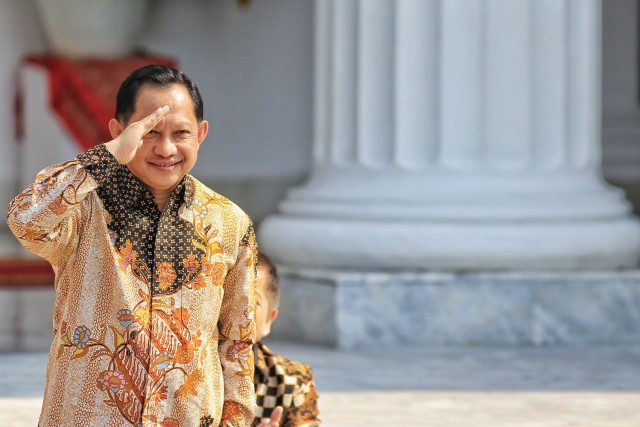Popular Reads
Top Results
Can't find what you're looking for?
View all search resultsPopular Reads
Top Results
Can't find what you're looking for?
View all search resultsTito TV: Minister wants face-recognizing surveillance cameras, says it will ‘comfort’ public
He said CCTV cameras could be connected to government systems to allow for facial recognition and fingerprint matching.
Change text size
Gift Premium Articles
to Anyone
H
ome Affairs Minister Tito Karnavian has asked regional administrations to install more closed circuit television (CCTV) systems connected to the local police to address crime and provide digital security measures for residents.
But with the data protection bill stuck in the House of Representatives and a lack of clarity about how CCTV footage is used and who has access to it, experts say that the expansion of CCTV could lead to violations of privacy and abuse of power.
Tito first mentioned his plan to put up more CCTV cameras last week. He then reiterated it in a meeting with the Indonesian Provincial Government Association (APPSI) on Tuesday.
"I spoke with some regional heads about building a CCTV [system]. This type of digital security should be developed in cities because if it is connected to the police system, the police can quickly respond," he said at the meeting, as quoted by the Home Affairs Ministry's website.
He said CCTV cameras could be connected to the ministry’s Directorate General for Population and Civil Registration (Dukcapil) to allow for facial recognition, fingerprint matching and other data use.
Tito cited Makassar, South Sulawesi, and Surabaya, East Java, as two cities that had already implemented this "digital security" model well.
“It provides comfort to the public, making them feel safe, while criminals also think twice about committing crimes," he said.
Institute for Policy Research and Advocacy (Elsam) deputy director of research Wahyudi Djafar, however, warned that such a program would lead to privacy violations if it was implemented without sufficient safeguards.
"In Jakarta, for example, there are already 7,000 CCTV cameras, but there are no clear regulations about their placement and how they can be used," Wahyudi told The Jakarta Post on Thursday.
He compared it to the European Union, which requires governments to post signs notifying residents of the presence of CCTV cameras and mandates the destruction CCTV footage every seven days.
"Even if the goal is to prevent crime and provide more security, there should be clear limits, otherwise the government is infringing on the public's rights," he said.
Wahyudi added that without a comprehensive data protection law, it was unclear who would be responsible for safeguarding footage and other data captured by CCTV cameras.
"Regional administrations often employ private companies as third parties to install and operate the CCTV systems," he said. "If the system is connected to the Dukcapil database, then who will be responsible if the footage or data is leaked?"
He pointed out that several CCTV cameras in Jakarta could be freely accessed online by the public, further increasing the risk of privacy violations.
"There is also no clear mechanism for reporting if the system is misused," he said.
Wahyudi said the need for increasing public safety should be balanced by a safeguard mechanism to ensure that the system is not abused.
"That's why the data protection bill needs to be passed soon to clearly lay out who has the authority to do surveillance and in what situations," he said.










